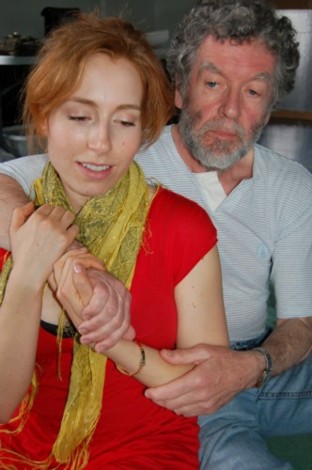
 From
May 31st until June 7th, The Vital Spark Theatre Company
presented the play Socrates On Trial
at the Telus Theatre, Chan Centre For The Performing Arts, in
From
May 31st until June 7th, The Vital Spark Theatre Company
presented the play Socrates On Trial
at the Telus Theatre, Chan Centre For The Performing Arts, in
While the history books may revere Socrates as a teacher and philosopher,
Socrates On Trial, which was
presented in the round, and based on the classic Greek works,
Clouds, by Aristophanes, Plato’s
monologue Apology and his dialogues
Crito and
Phaedo, certainly paint a different
picture of the Athenian. Act I opens outside the city of
In
Act I Socrates is presented to us as a pompous, arrogant and often petulant
individual, who ridicules the notion of the Greek gods, something that would
later contribute to his downfall. Socrates makes short work of James Gill’s
character Strepsiades, reducing him to a reasonable facsimile of the two
brothers Darryl, who appeared on the old Bob Newhart television show.
What
I found particularly invaluable throughout this production, were the two
prologues delivered by Steve Baumber. He allowed theatergoers to understand the
historical context of the Acts that would follow, as well as helped us to
appreciate the social, political and cultural influences that prevailed
throughout Socrates’ lifetime.
While the first act was bizarre and certainly not what one would have expected,
during a play portraying Socrates’ life, the second and third Acts were
classical, and filled with the type of arguments, debates and philosophical
meanderings that you would fully expect to encounter in a production of this
nature. Act II is set twenty-five years after the first performance of
Aristophanes’ Clouds. We find
Socrates now facing trial, on the charge that he has corrupted the young.
Socrates is accused of convincing the youth that there were no Greek gods, which
his accusers contend contributed to their loss to the Spartans, during the
Peloponnesian War.
How
plead you, Socrates? Enter Paul Toolan as an older Socrates, who with all due
respect, to his counterpart Dave Campbell from Act I, Toolan put in a brilliant
performance. It takes an extremely gifted actor to hold an audience’s attention,
for any more than two or three minutes during a monologue, but for the most part
the entire second act consisted of Socrates speech to his accusers Meletus
(Daryl Hutchings), Anytus (Amanda Konkin) and Lykon (Steve Baumber). The key to
Toolan’s monologue is he made the speech his own.
He became Socrates, and for the moments that his character filled the
stage, you believed that he was indeed Socrates. When Socrates turns Meletus’
own arguments against him, you are cheering for Socrates, and you would have
been, even if it were not for the cue cards that appeared in the nether regions
of the theater. Yes, the audience was encouraged to participate. Not since my
days in
It
should be noted that Hutchings and Konkin appear throughout the play, cast in
other supporting roles, and put in fabulous performances.
Once
judgment is passed on Socrates, he begins a new debate, regarding what should be
considered a fair sentence, and at one point, he puts forth the preposterous
proposal that he should receive all of his meals for free.
The
most emotionally charged scenes in
Socrates On Trial, occurred in his cell, while he was waiting for the
executioner. The conversations with
his friends and his wife bore the marks of angst, anguish, frustration and
grief.
Riveting Riffs Magazine says BRAVO, to the entire cast for a fine production.
Now let’s hope that Andrew Irvine and Joan Bryan’s efforts are recognized, and
they can turn this into a touring production.
Photo by Doug Williams protected by copyright ©